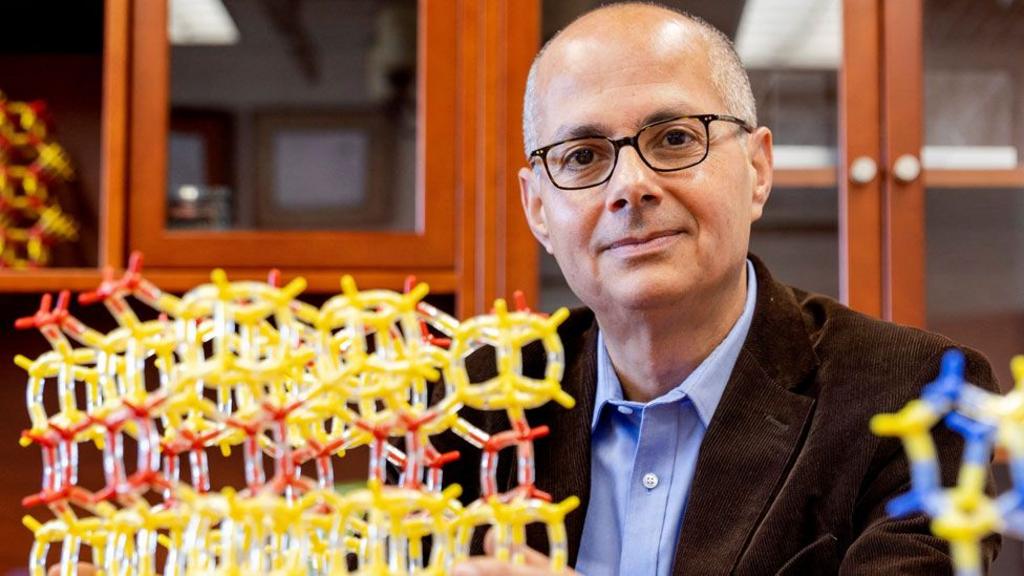“`html
The Nobel Prize in Chemistry has been awarded to Susumu Kitagawa, Richard Robson, and Omar M. Yaghi for their groundbreaking contributions to the development of metal-organic frameworks (MOFs).
The laureates’ research holds immense potential to address critical global challenges, including carbon dioxide capture for climate change mitigation and chemical approaches to reducing plastic pollution.
“I’m deeply honoured and delighted, thank you very much,” Professor Kitagawa expressed during a press conference after receiving news of the award.
He added, “How long do I have to stay here? Because I have to go out for a meeting,” highlighting his dedication to ongoing scientific endeavors.
Professor Kitagawa is affiliated with Kyoto University in Japan, Professor Richard Robson is at the University of Melbourne, Australia, and Professor Omar M. Yaghi is at the University of California, US.
The three Nobel laureates will share a prize sum of 11 million Swedish kronor (£872,000).
Their pioneering work centers on the construction of molecules into intricate structures known as metal-organic frameworks (MOFs), a concept the Nobel committee has lauded as “molecular architecture.”
The researchers devised methods for creating these frameworks with significant interstitial spaces, facilitating the flow of gases and other chemical substances.
These internal “cavities” can be utilized to capture and store targeted chemicals, including atmospheric carbon dioxide and persistent pollutants such as PFAS compounds.
The scientists’ individual investigations into these structures commenced in the 1970s and 1980s. Professor Robson famously requested that his university drill holes in laboratory worktops to enable the construction of models using wooden balls (representing atoms) and rods (representing chemical bonds).
Currently, MOFs are primarily employed on a small scale, but companies are actively exploring the feasibility of mass production.
One potential application lies in the decomposition of hazardous gases, including those associated with nuclear weapons.
Furthermore, companies are assessing the utility of MOFs in capturing carbon dioxide emissions from power plants and industrial facilities.
Professor Robson, originally from North Yorkshire but based at the University of Melbourne since 1966, remarked to BBC Newshour that the announcement “wasn’t a big surprise [because of] all sorts of sounds I’ve been hearing over the years.”
When questioned about the potential applications of his research, he cautioned, “There’s talk about binding CO2 and solving the world’s atmospheric problems, which don’t sound realistic to me – but these sorts of compounds could do that sort of job on a small scale.”
The 88-year-old professor admitted that the prize money “is the main thing actually in my head. It wasn’t the driving force for all of this but at this stage in my life that’s a very nice thought to have.”
The award underscores the critical role of chemistry in addressing some of the most pressing challenges facing the planet.
“Every year we see Nobel Prizes given to chemists who welcome the challenge of finding solutions to the biggest problems our global society faces – better healthcare, environmental protection, clean energy, and secure food and water for everyone,” stated Dr. Annette Doherty, president of the Royal Society of Chemistry in Britain.
The announcement was made by the Royal Swedish Academy of Sciences at a news conference in Stockholm, Sweden.
According to the Nobel committee, Professor Kitagawa was motivated by the principle of “the usefulness of useless,” reflecting the philosophy of the ancient Chinese philosopher Zhuangzi, who posited that even seemingly inconsequential endeavors could ultimately yield valuable outcomes.
Professor Yaghi, born in Amman, Jordan, was raised in modest circumstances, sharing a single room with his siblings without access to electricity or running water, according to the Nobel committee.
He became fascinated by molecular structures during his schooling and, at the age of 15, moved to the United States to pursue his academic interests.
This marks the third science prize awarded this week. On Tuesday, John Clarke, Michel H. Devoret, and John M. Martinis received the Nobel Prize in Physics for their work on quantum mechanics, which laid the foundation for quantum computing.
On Monday, three scientists were recognized with the Nobel Prize in Medicine for their discoveries regarding the immune system’s mechanisms for combating infections.
Dr. Fred Ramsdell was reportedly “living his best life” offline when the Nobel committee attempted to reach him.
The prize-winning discovery elucidates how the immune system targets hostile infections while sparing the body’s own cells.
The BBC surveyed Americans in Washington regarding the qualities they believe the U.S. president must possess to earn the prestigious award.
After previously suggesting his own worthiness for the prize, the president told CBS News that his primary focus remains on saving lives.
Sir David MacMillan suggests his work in molecular chemistry could lead to a treatment for Alzheimer’s disease within the next five years.
“`

